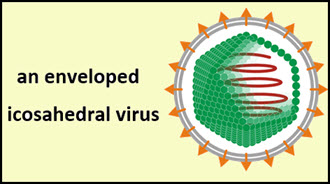Icosahedral viruses - potential extended essay
Sunday 14 June 2020
 Most of us know a lot more about viruses now than we did a few months ago. I was fascinated to learn that some viruses exhibit very interesting geometric properties. The virus causing the current global pandemic is a type of coronavirus officially known as SARS-CoV-2. Coronaviruses are a large family of viruses that are primarily known for causing diseases in farm animals but also account for an estimated 15% to 30% of common colds in humans. Coronavirus particles are surrounded by a fatty outer layer called an envelope and usually appear spherical, as seen under an electron microscope, with a crown or “corona” of club-shaped spikes on their surface (https://www.newscientist.com/term/coronavirus/). Within the envelope is a protein shell called the capsid that contains the virus’ genetic material - a long strand of ribonucleic acid (RNA). All viruses have a capsid and many of them have an inherent symmetrical structure which is either shaped like a helix or an icosahedron. SARS-CoV-2 is an icosahedral virus.
Most of us know a lot more about viruses now than we did a few months ago. I was fascinated to learn that some viruses exhibit very interesting geometric properties. The virus causing the current global pandemic is a type of coronavirus officially known as SARS-CoV-2. Coronaviruses are a large family of viruses that are primarily known for causing diseases in farm animals but also account for an estimated 15% to 30% of common colds in humans. Coronavirus particles are surrounded by a fatty outer layer called an envelope and usually appear spherical, as seen under an electron microscope, with a crown or “corona” of club-shaped spikes on their surface (https://www.newscientist.com/term/coronavirus/). Within the envelope is a protein shell called the capsid that contains the virus’ genetic material - a long strand of ribonucleic acid (RNA). All viruses have a capsid and many of them have an inherent symmetrical structure which is either shaped like a helix or an icosahedron. SARS-CoV-2 is an icosahedral virus.
I recently came across an article in the online magazine Quanta (written nearly three years ago) entitled The Illuminating Geometry of Viruses. The subtitle of the article is: Mathematical insights into how RNA helps viruses pull together their protein shells could guide future studies of viral behavior and function. In depth analysis of how an icosahedral virus builds its protein shell (capsid) lead to mathematicians applying concepts of graph theory (specifically Hamiltonian paths) to understanding the process. After reading this article – and other online content about virus architecture (listed below) – I became convinced that the mathematics related to icosahedral viruses would be a promising topic for an extended essay in mathematics.
Principles of Virus Architecture
On the Geometry of Icosahedral Viruses
How a virus forms its symmetric shells
Icosadeltahedral Geometry of Geodesic Domes, Fullerenes and Viruses: A Tutorial on the T-Number

